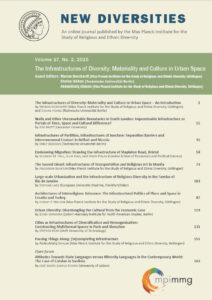Cities as Infrastructures of Diversification and Homogenisation: Constructing Multiformal Spaces in Paris and Shenzhen
by Stephen Read (Delft University of Technology)
To cite this article: Read, S. (2015). Cities as Infrastructures of Diversification and Homogenisation: Constructing Multiformal Spaces in Paris and Shenzhen. New Diversities, 17(2), 131–149. https://doi.org/10.58002/mmtq-0252
Cities have made urban people. Cities are the material condition of complex urban societies and people have been actively formed in them as products of and complements to the politics and economies that cities have engendered. Urban identities and economic roles have formed and massively differentiated and complexified beyond those of pre-urban and rural societies. People have diversified as economic roles especially have divided and formed them around organising and integrating cultures and practices. Cities have, at times and under particular conditions, been diversifying infrastructures, but cities have also, in different times and under conditions of modernisation, industrial rationalisation and the rescaling and financialisation of economies, become infrastructures of homogenisation. In historical and at least partly contingent processes cities have complexified and opened rich and diverse opportunities for livelihoods in particular times and places and decomplexified and closed and diminished opportunities in others. The paper will take the reader on an historical journey through a number of iconic cases, starting in medieval Paris and finishing in contemporary Shenzhen to demonstrate that processes of diversification continue, still today, to open urban lives and livelihoods to urban newcomers, while modernising and homogenising processes threaten those lives and livelihoods.
Keywords: urban diversity, urban economy, relationality, Paris, Shenzhen
|
